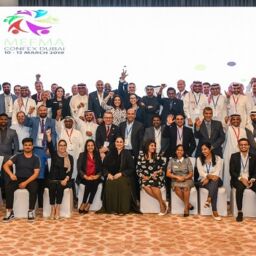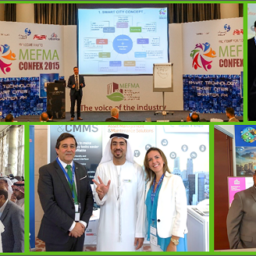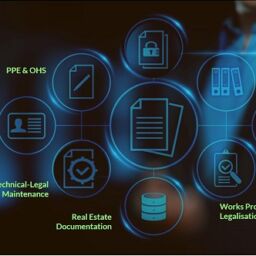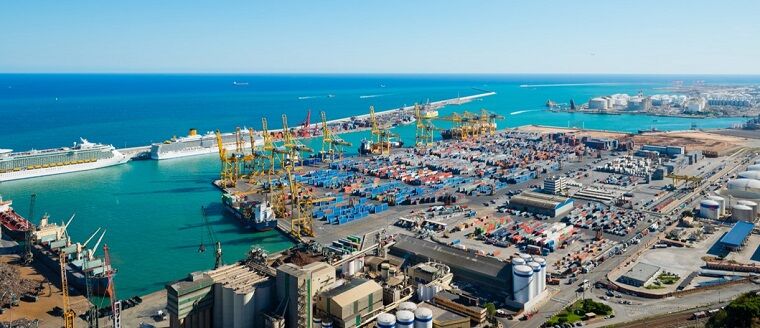
Our client, the Port of Barcelona, organises for the second consecutive year, the event ‘Smart Ports: Piers of the Future’ in which the importance of having an intelligent and digitised port is shown
The event will hold its second virtual and streaming edition on November 17 and 18, a space in which leading ports in innovation, such as Antwerp, Hamburg, Los Angeles, Montreal, Rotterdam, Busan and Barcelona, present the projects they are carrying out related to digital transformation.
A smart port is one that uses automation and innovative technologies including Artificial Intelligence (AI), digitisation, big data, the Internet of Things (IoT) and blockchain to improve its performance. With these tools, our client, the Port of Barcelona, is committed to a smart port model that involves evolving towards a more efficient and sustainable port, with the capacity to provide continuous service.
The relationship between ports and the cities that host them is increasingly intense. Both have ceased to be juxtaposed realities and there are more and more ties that unite them. Along this integrating path, Barcelona has become one of the leading cities at the international level in the development of smart policies.
Its port today is one of the benchmarks in the development of a smart port model, where technology manages to automate processes, connect the different parties in the logistics chain in platforms that streamline transactions and bureaucratic procedures while making them reliable and traceable; where the data collected throughout these interactions between vehicles, sensors, people and institutions allow better decisions to be made.
The Port of Barcelona has developed its own smart port model based on the academic smart city model, which comprises six different dimensions of transformation adapted to the port environment: logistics, mobility, environment, economy, people and governance. Adopting the smart port model has represented different challenges that ports must face and that can be grouped into five challenges:
Cybersecurity
More and more ports decide to carry out risk analysis in order to take measures related to cybersecurity. Furthermore, the increase in cyberattacks in recent years has made maritime administrations begin to take action.
Applications based on big data
Data analysis, along with deep learning, can lead to the creation of predictive and prescriptive systems that anticipate responses and incidents, helping stakeholders to make decisions.
Blockchain
The Blockchain will allow the development of more secure and reliable automatic execution smart contracts, that is, an automated process to be able to exchange goods or services between companies. The Port of Barcelona is working on a project that aims to digitise the “Bill of Landing”, a document used in maritime transport to certify the reception and loading of the goods to be transported on board, through blockchain technology. A technological advance that would mean a considerable reduction in costs and risks.
Geolocation
The development of geographic information systems (GIS) with added value would help to accelerate processes and change the dynamics of the port: from detailed monitoring of the cargo status to monitoring vehicles, allowing certain tasks to be automated. It involves carrying out traceability and geolocation tasks to identify and monitor events of interest based on image analysis.
Traffic management systems
The so-called Gate Appointment systems (GAS), or reservation systems, are the answer that many port authorities are giving to this question to remedy the negative side effects of intermodal transport around ports, as containers constantly arrive and leave from terminals, which can lead to congestion and traffic jams.
Showing to the world the advances in digitisation and sustainability of ports is necessary to favour the development and decarbonization of maritime-port activities. The economic and social sphere play a significant role in a smart port, the Port of Barcelona is fully aware and that is why it actively promotes innovation. Examples of this are the Smart Catalonia Challenge, a competition that promotes open innovation to solve territorial challenges in Catalonia, or Pier01, a hub for promoting entrepreneurship and innovation in Barcelona Tech City.
In November 2019, the ninth edition of the Smart City Expo World Congress was held, an international event focused on urban evolution and innovation. Taking advantage of its international reach, the Port of Barcelona organised the “Smart Ports: Piers of the Future”, an exhibition space to which it invited the most advanced ports in the world in this field. Those ports were: Ambers, Hamburg, Los Angeles and Rotterdam. This year a new edition will be held and, as a novelty, the port of Busan, the largest on the Korean peninsula, will also be present. On this occasion, due to the current pandemic situation, the Smart City Expo World Congress will be held in virtual format, as well as Smart ports: Piers of the future, which can be followed in streaming.
Source: “El Periódico” – Printed edition September 2020
About Smart Ports: Piers of the Future
 Under the slogan “Thinking ahead, globally”, Smart Ports: Piers of the Future is an international event organised by the Port of Barcelona and is emerging as the ideal opportunity to exchange ideas, projects and initiatives related to the sector. The event is part of the Smart City Expo World Congress 2020 (SCEWC) and takes place on November 17 & 18, in virtual format and in “streaming.
Under the slogan “Thinking ahead, globally”, Smart Ports: Piers of the Future is an international event organised by the Port of Barcelona and is emerging as the ideal opportunity to exchange ideas, projects and initiatives related to the sector. The event is part of the Smart City Expo World Congress 2020 (SCEWC) and takes place on November 17 & 18, in virtual format and in “streaming.
It is an event of global relevance that seeks to give visibility to proposals, business models and innovation, focused on ports and their relationship with the world. An event that will serve to show the importance of having an intelligent and digitised port, committed to the environment, and above all, connected with the inhabitants of their cities and the planet.
The agenda includes different panel sessions (live streaming) and project spotlights, which will present the highest officials of the ports participating in the event. During the two days they will talk about digitisation, innovation, cybersecurity, sustainability and other issues related to the port sector.
About the Port of Barcelona
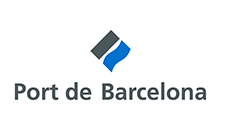 The Port of Barcelona has a 2000-year history and great contemporary commercial importance as one of Europe’s major ports in the Mediterranean. It is the first port in Spain for international traffic, more than 100 regular lines connect it with more than 200 ports on the five continents. more than 100 regular lines connect it with more than 200 ports on the five continents. It is the main transport and services infrastructure in Catalonia, the second port in Spain in terms of traffic and the first in billing and value of goods. As for the transport of people, it is the largest port in the Mediterranean in cruise traffic and the fourth in the world only behind the ports of the Caribbean.
The Port of Barcelona has a 2000-year history and great contemporary commercial importance as one of Europe’s major ports in the Mediterranean. It is the first port in Spain for international traffic, more than 100 regular lines connect it with more than 200 ports on the five continents. more than 100 regular lines connect it with more than 200 ports on the five continents. It is the main transport and services infrastructure in Catalonia, the second port in Spain in terms of traffic and the first in billing and value of goods. As for the transport of people, it is the largest port in the Mediterranean in cruise traffic and the fourth in the world only behind the ports of the Caribbean.
About ROSMIMAN® Smart Ports
 Facility Management Solutions for Port Infrastructures.
Facility Management Solutions for Port Infrastructures.
ROSMIMAN® Smart Ports allows fully manage all aspects related to port systems operations and maintenance by implementing complex conservation plans and planning services.
ROSMIMAN® Smart Ports provides a comprehensive technical and unifier Management system that allows to control all information in order to better help decision-making, considering different natures and services of each item (any kind of tangible asset and/or intangible service) deployed in the facilities and infrastructures of the port entity.
Key features:
- Geospatial Inventory Management / GIS.
- Management of Actions / Conservation Plans.
- Purchasing / Warehouses / Uniforms Management.
- Utilities Management.
- Maintenance Management / Navigation Aids / Vehicle and Ship Fleet.
- Subcontractors and Concessionaires Management.
- Business Intelligence / Dashboards / KPIs.
- Integration with existing IT Systems.
- Smart Apps.
- Smart document Management.

